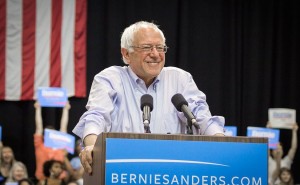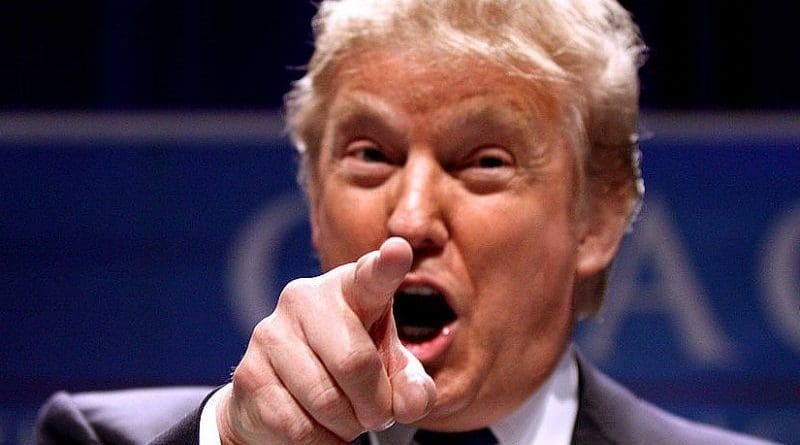Trump Vs Aristotle: Man From LA Vs Man From Athens And The Death Of Politics (2/7) – OpEd
We don’t know if the best interpretation of Entropy is either “disorder” or “dispersion of energy,” but both are vital to understand the confrontation of Donald Trump’s politics versus those of Aristotle’s Politics. Whether we want to examine Trump with the lenses of the Laws of Entropy with respect to the media disorder he is pioneering as a new tool of politics, or for the dispersion of neuralgic energy from traditional economy power centers that he is generating with his political decisions, in both cases one thing is certain: Reference to the Laws of Entropy is needed if we want to understand Trump’s politics.
Trump’s Election As Application Of Laws Of Entropy In Human Affairs: From ‘Order To Disorder’
We certainly know that this universe (I remark the italics of this, to postulate our universe within the very likely existing multiverse system) is continuously going from order to disorder, and quite obviously this is also true with respect to human affairs – it could not be different – therefore when we rearrange elementary components to provide a new useful order in physics, as we do in politics, we must always be aware that the new useful order is fated to end.
People forget when they complain of Trump’s election, as a step forward destroying a previous political order, that any arrangement of elementary components (which we like to call order) – natural or man manufactured – is due to last only a limited time, as such then the indestructible universal laws (often underlined in his time by Buddha) of any composite body, as well as any political structure, will decay.
Let’s not forget that disorder will dismantle not only any physical aggregation, but it will do the same for any established political order. This is because any order, both physical or social, doesn’t last forever. Trump, in politics, is the proof of the consolidated principle of Buddha: There is always a decay of a temporary physical and social aggregations. “Ananda, why do you cry for my death, don’t we know that all bodies will be reduced to their components?”
But if Trump’s election is just an inevitable case of the application of the Laws of Entropy to human affairs, the next obliged question is: How do we best deal with Trump’s disorder? Do we try to revive the previous political order or do we engage ourselves to work for a new order? The answer depends on whether we consider the change conclusive and permanent or just provisional. And since there are good reasons to consider Trump’s changes to be permanent, then while we keep criticizing lost values and oppose negative policies, we must also look at Trump’s disorder as a chance to work for creating a new order that might deserve surprising new positive effects.
But as we engage in looking for positive values in Trump’s adventure — which the President appears to be trying daily to make it harder and harder to do so — we must never forget that for more then twenty centuries we were able to refer for our discussions on “politics” to Aristotle’s eight books (chapters). Now, however, after Trump’s election, unless we totally restate its meaning the term “politics“ is dead. Is “Corporatics” of the the Man from Los Angeles a proper substitution for the “Politics” of the Man from Athens?
Trump’s Election as Application of Laws of Entropy in Human affairs: The ‘Dispersion of Energy”

Writing to a director of the Center where I am connected at USC, I told him several times that Bernie Sanders would beat Trump, but Trump would certainly beat Hillary Clinton. I wrote him that prediction over and over, even when Trump was disregarded as an official contender and even when all polls declared that Hillary was the winner. The reason in my mind was very simple: American voters in each party were tired of obsolete slogans and were looking for “a new deal” in each camp.
In both camps they wanted a totally new fresh attitude in internal affairs, where social crises were highlighted by recurring dramatic (or trivial) gratuitous violence, resurgence of excessive (or deficient) minority discrimination and disproportionate (or feebleness) political determination. And in foreign affairs they were weary of cloudy declarations on promotion of freedom, human sensitivity and assertion of uniqueness of America love of peace that didn’t prevent wars while didn’t assure victories.
That is why in both fields they wanted something radically new. People were tired of conservative rightist politics and exhausted of conservative liberal politics — we do have to accept the principle that liberal politics can be at time boring conservative. People felt that a “new deal” was needed in any case: a “conservative new deal” or a “progressive new deal”, but in each case the candidate had to propose a “real new deal”.
Thus since Trump was interpreting a “conservative new deal” that was much better than any of the other Republican contenders, I thought he would win the primary. And if the liberal establishment was going to get Hillary to win the primary, since she was not interpreting a “progressive new deal” I was sure that she would lose to Donald. Bernie was the only chance that liberal politics could beat Donald because he was really representing a liberal version of “a real new deal,” something which Hillary had failed to express. I am personally inclined to say that Bernie was a magnificent interpreter of a “great new deal”, and I am fully convinced he would have been a wonderful alternative to launch a new world vision of economy. Nevertheless, while we might very much miss Bernie, we still have to look at the Laws of Entropy to fully appreciate Trump’s presidency.
The Laws of Entropy say that during the existing continuous universal transformation process from order to disorder, some energy is lost (rather diffused) to the point that the final result for our universe will be a motionless lifeless entity.
Personally without being a physicist I do not accept this position, but I reject it on philosophical grounds that would not be appropriate to discuss here. (1). For what we are now concerned with here in this essay, it is important to observe that we might look at “politics” not only as a status quo that we want to protect from Trump’s disorder, but also as “energetic working system” induced by disorder where Trump’s politics could present positive aspects in terms of new vital energy.
That “disorder” in terms of “energetic working system” can produce some positive results in terms of politics as we know from both the history of both parties. That was certainly the case of the Reagan administration, of Roosevelt’s presidency and with all probability would have been the case with Bernie’s election. A shake up was needed in both parties. Trump’s politics promised a conservative shake up, Bernie would have been able to provide a liberal shake up, which was not in the cords of Hillary. If Bernie had won the primary, the election would have been a confrontations between two political shakes. In both cases, the Laws of Entropy as diffusion of energy would have been applied.
My opinion was that Bernie would have raised expectations for a progressive new vision of America to such a high level that in the head-to-head confrontation, his “liberal new deal” would have beaten Trump’s “conservative new deal”.
Aristotles’ politics: “Democracy is the rule of the majority of citizens.”
Trump’s politics: “Hillary Clinton wins 2,864,974 more votes then Trump, but on Jan. 20, 2017 Trump is inaugurated as president.”
Once we accept the idea that to understand Trump we must study him with regard to the Laws of Entropy, why do we feel that “politics,” as described by Aristotle’s definition is dead to the point that we need to invent a new term?
The reason is that with Trump’s election two of Aristotle’s basic pillars of “politics”, “agora communication” and “agora concept of Citizen”, have been radically superseded.
The first, “agora change” is important not so much for the recent burst in social networks, — which despite the recognized clamor of their innovations are just a modern, even positive IT version of traditional assembly — but because communications have moved from factual contents to entertainment performances to reflect the most striking change of human history in the second part of last century: the coming age of a world entertainment society, where during the electoral process, for a candidate to have proper make up can play a more significant role then to defend free education.
Democracy, for the Man of Athens, was a system by which all vital issues of the Polis were decided by the majority of people. The content of the issues to be decided were: “discussing whether or not to sign treaties, voting to raise or spend funds, debating military matters, appointment of a single man rule for the emergence and of course the most vital issue of a State, war and peace”.
Democracy was so much important that the assembly could also vote to ostracize from Athens any citizen, and that was the case of the man that with his military genius had saved the democracy of Athens from the attack of the most powerful country and had succeeded in the almost impossible task of defeating the immensely more powerful Persian army. Themistocles was exiled because people that democratically had brought him to power – in modern terms he could be called a populist because he appealed directly to the lower classes against the nobility – democratically expelled him from his country. Democracy functioned in a merciless way: To send away in the name of democracy the person that miraculously had saved democracy.

American democracy should keep this example in mind, especially when we witness that with regard to the issue of the wall with Mexico there were 3 million more people opposing such a policy than those voting in favor — and the man of the wall becomes President and he will start building that wall. But why is that possible? Because building “a wall against Mexico” was a masterpiece of communication slogans in the best of Hollywood standards that overshadowed all other essential issues. A “coup de teâtre” in the best movie style, that probably single-handedly led to Trump’s election because it epitomized unemployed white male dissatisfaction in one visible symbolic slogan. Thanks to the “build a wall with Mexico”, the superior ability of Trump’s communication magicians had made disappear from public debates other real tough issues. Therefore let us notice that the old Aristotle’s “politics” is challenged not because votes are auctioned on the TV screen in a new multi-million agora spending system, but because they are auctioned with a slogan and advertising techniques that hide the real issues.
Aristotle’s politics: “Wherever the poor rule, that is democracy.”
Trump’s politics: 17 members of Trump cabinet, owners or heads of corporations, have more wealth then 1/3 of Americans.
The communication skills, borne in LA – Hollywood – focus the attention of the voters on trivial matters to provide the elected candidate the capacity to rule freely on real issues. Advertising has no time for promoting the real quality of a car. It prefers to play a game of individual personal emotional feelings to make somebody choose a Mercedes rather then a Porsche.
Oh Lord, won’t you buy me a Mercedes Benz?
My friends all drive Porsches, I must make amends.Janis Joplin, wonderful – past – proletarian singer, asks God to buy her a Mercedes Benz not because is a more secure car, but because it distinguishes her working life from the easy life of friends that buy Porsches.
‘The Times They Are A changin’: A ‘Trump Forever’ Or A ‘Future Bernie’?
With the emergence of the Man from Los Angeles the concept of Citizen concludes the most striking change ever: “Citizenship” does not refer to the individual anymore, but to corporations. Please notice that a Corporation, doesn’t get married, doesn’t read books, doesn’t produce children, doesn’t get sick, but it decides if same-sex marriages are possible, if educational books must reflect peoples’ values or corporations’ values, if the right to abortion must protect the women’s freedom or abide to religious decisions. And that is just the beginning. A fictitious individual (corporation) that does its best not to pay taxes in its country – usually very well succeeding not to pay them – decides how much less taxes have to pay rich people and how much more taxes have to pay common people. But even more bizarre, fictitious individuals (corporations) that have no blood and no flesh decide if Washington has to make war in Iraq, Afghanistan or Iran, and therefore to dispatch American people (not the corporations) to kill people of other polis and and to be killed for obvious retaliation.
When fictitious citizens (corporations) with no flesh and no blood make the decisions of blood to be shed or flesh to be sacrificed, that is the straw that breaks the camel’s back: Aristotle’s politics is dead. Let’s face it. A totally new scenario is developing in which “politics” as we knew referring to Aristotle’s books is totally out of the picture and we are in urgent need to invent a new word to replace “politics”, otherwise we engage ourselves in commenting, quarreling, arguing on qualities of apples, while we eat oranges.
Our well-deserved literature Nobel Prize collected through Bob Dylan – that Noble Prize was given to all of us who sang Blowing in the Wind, as the Noble Prize to Dario Fo was given to all of us who laughed at the Mistero Buffo – sent a world message in 1964 that “The times they are a changin’!
Did the America’s Liberals fully get this message? No.
Trump of course and Bernie are symbolic paradigms of a polis ruled forever by the “man from Los Angeles” or from the “man from Athens”. But in both cases, we have the obligation to start working the “good and bad” of the new “Corporatics order” in the best interest of America’s role.
Trump wants to use the heads of corporations in his cabinet? If you are not a billionaire then you are not going to be in government? Then why don’t we start working on a new “social contract” borrowing the term from Rousseau between “corporation individuals” and “individual citizens”?
Tocqueville, American democracy and Rousseau, new social contract

In a possible new “social contract” there are “corporation ministers” and “common citizen ministers”. Can we accept a Secretary of State coming from the oil industry? Yes we can. So many wars came from oil that we can positively assume he will be able to properly work on some better solution then just to make war to regulate conflicting interests. The present corporate Secretary of State may choose negotiations, rather then fighting. And for the final holocaust war produced by nuclear weapons, a corporate Secretary of State clearly provides much more of a sense of security. Corporations want to become richer, they don’t want to run the risk of world destruction in name of power. No Hitler will ever be produced by a CEO selection.
On a different chapter of the new “social contract”, can we accept a Secretary of Education coming from private sector? Certainly no. She will not be acceptable for the future of America’s education. And in the chapter of environment protection, a CEO coming from corporate world cannot be entrusted to regulate the matter, since corporations have ignored environmental issues for decades to avoid damages. In other words, a new “social contract” will have to balance roles and functions between corporate (fictitious) citizens and human (real) individuals, and do that officially.
Why we should do this? Because Democracy changes. And we must recognize, no matter how much we might not be pleased by Trump, and certainly we are not pleased at all in many situations, it is thanks to him that America is again in Tocqueville’s time, presenting a working new model of democratic system. As such, we better study that model in a constructive way if we want to save some valuable old principle and perhaps add some previously impossible ones.
In this respect we are lucky to be able to watch America’s Trump election, because it is still by far the best place where democracy is in evolution. A new democracy that could provide not only the basis of a new “social contract” and also a new Tocqueville reasoning, in term of “Corporatics” logic could benefit all the world.
An Upanishad Guru: Knowledge And Names
When I wrote the first article, Trump vs. Aristotle, the “Man of Los Angeles” buries the “Man of Athens”, I asked Noam Chomsky to help me to provide a new name for “politics”. The greatest living linguistic scientist and at the same time the most profound visionary of decent modern life, was in my mind the right person to provide a new term. Since I am lucky to be able to communicate with him, I asked him a suggestion.
The search of a new term reminds me of a very old Upanishad story, where a young student begs his Guru to tell him how to reach freedom. The Guru asks him what did he do to get the needed deliverance. And the young man says that he studied mathematics, science, medicine, poetry. The Guru sends him away to work. But when the student comes with lists of additional studies, the Guru sends him again away. That happens at year’s intervals many times. At the end, when the student – young but not ready to eternal repetitions – makes a very long list of what he studied and he is clearly not ready to go again away, then the Guru explains to him that what he did while studying for his goal (freedom) was useless because he had learned names. Of course we know that “Politics” has very little to do with names, but in our case if we bury the term “Politics” and we start using a new one, it might be easier to think to of new Social contracts, and to a new Tocqueville version of America democracy.
Is the new name “Corporatics” a new term that makes the best fusion of Hollywood, Silicon Valley, and the Corporate world” and the search of a new form of Democracy? Let’s hope the great Noam will provide us with the most proper new name for reaching out of entropic Trump’s disorder, towards a possible constructive new America’s order. It will benefit all of us. When I send him this article I will ask again.
End of part II: Next Trump vs Aristotle, Metaphysics (3/7).
Check out Part One here.
Notes:
1. Let’s not forget that science came always out of philosophical exercise and its disasters come always from a lack of a philosophical approach in scientists.

